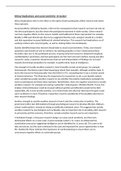Ethical implications and social sensitivity 16 marker
Ethical implications refer to the effect on the rights of both participants within research and whom
they represent.
Social sensitivity, defined by Stanley, refers to the consequences that research can have not only on
the direct participants, but also whom the participants represent in wider society. Some research
can have negative effects on the careers, health, and livelihood of those represented. For example,
Bowlby’s MDH and Monotropic theory has suggested that the main caregiver should be a mother,
and that separation increase likelihood of criminal behaviour. This research had implications on all
working mothers who may feel guilty, as well as making fathers feel inadequate.
Stanley identified steps that research should take to avoid social sensitivity. Firstly, any research
questions used should not aim to reinforce any existing prejudice or bias’s (heterosexual bias).
Secondly, take care in the participant process, ensuring informed consent is obtained throughout,
confidentiality is prioritised, and that participants are free from any harm (before, during and after
research). Lastly, researcher should ensure that use and interpretation of findings are not used
towards discriminate prejudices for example, to justify ethnic basis of intelligence.
One strength of socially sensitive research is how it benefits certain social groups, for example
homosexuals. The Kinsey report interviewed guys about their sexuality, although sensitive topic, it
led to the removal of homosexuality from the DSM in 1973, concluding that it was a normal variant
of human behaviour. This illustrates the importance for researchers to do a cost-benefit analysis
when considering socially sensitive research to see whether the positive implications outweigh the
harm to participants and those they represent. Nevertheless, there are negative outcomes to socially
sensitive research, for example uncovering a potential ‘criminal genes’ (MAOA+CDH13). If true, this
implies criminal behaviour could be excused without sanction and offenders would not be held
responsible, this is very socially sensitive, as it means those who discover they have this gene could
use it as defence in court, Therefore, researchers must be considerate of the possible outcomes to
their research findings.
Another strength to socially sensitive research is how it aids the construction of policies. The
government often test ONS statistics through psychological research to develop effective childcare,
school, health policies, instead of relying on politically motivated views. This suggests that socially
sensitive research by psychologists such as Bowlby, play an important role in providing valid research
to aid society and the economy, Therefore, socially sensitive research can be very important.
A limitation though, is that poor research design can cause social sensitivity, and thus have
detrimental effects on a mass scale. A prime example is Burt’s 11+ exam, he influenced the
examination process by suggesting intelligence can be identified by 11 years old. This came to be
fake and untrue, yet the exam continued to be used and impacted the career opportunities in later
life. Studies like these reiterate the importance of careful planning to ensure there are no
unnecessary negative effects on vulnerable groups.





